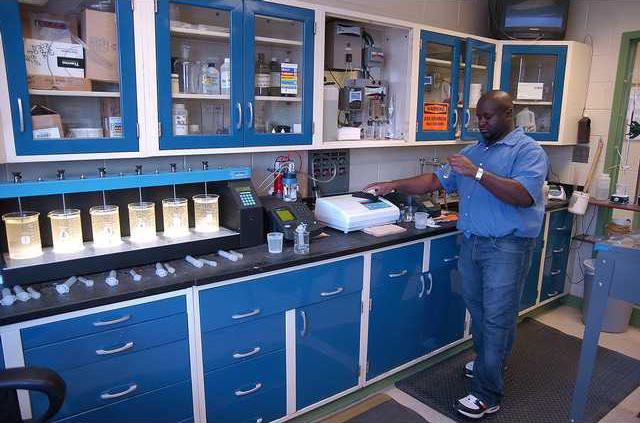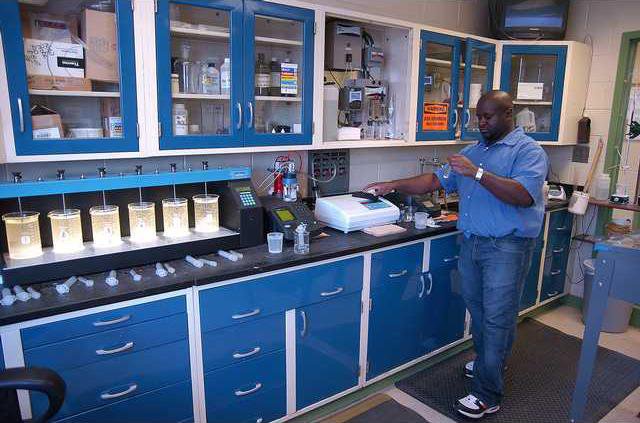Are there drugs in Gainesville’s drinking water? Nobody knows.
Since the government does not require it, the Gainesville Public Utilities Department does not test for the presence of pharmaceuticals in Gainesville’s water supply.
"We’re not required to do any type of pharmaceutical or hormone analysis," said Stanley Mize, manager of environmental and treatment services for the Gainesville utility.
Gainesville’s water treatment plants conduct anywhere from 12 to 15 tests on drinking water daily, analyzing the cloudiness of the water and determining the amount or presence of dissolved metal content, iron, chlorine and giardia, a parasite that causes stomach problems, Mize said.
But none of the tests tell water officials whether drugs are in Gainesville’s drinking water.
"Those other things ... are simply not regulated, they’re not currently in place to serve as a water quality indicator, so EPA and EPD doesn’t require us to sample for those things," Mize said.
A recent report by the Associated Press found that prescription drugs and over-the-counter drugs are in drinking water supplies of at least 41 million Americans. AP tested the supply of 28 major metropolitan areas, including Atlanta, which had traces of acetaminophen, caffeine and cotinine, a metabolite of nicotine.
Other cities had trace amounts of drugs ranging from antibiotics to anti-convulsants, mood stabilizers and sex hormones in their drinking water. The concentrations of the pharmaceuticals are small — measured in quantities of parts per billion or trillion — but the mere presence of so many different prescription drugs worries some scientists about its long-term consequences to humans’ health.
Pharmaceuticals contaminate aquifers and surface water alike in a nation where the number of prescriptions has risen to 3.7 billion — a 12 percent increase in five years, according to the report.
The Environmental Protection Agency and the state-level Environmental Protection Division do not require utilities to test for drugs in the drinking water supply, and say there are no sewage treatment systems capable of removing pharmaceuticals. Reverse osmosis removes nearly all pharmaceutical contaminants from drinking water, but it is very expensive for large-scale use. The technology also leaves several gallons of polluted water for each gallon it makes drinkable.Mize does not deny that pharmaceuticals may be present in the Gainesville water supply, but testing for pharmaceuticals requires special equipment.
"Obviously, we have a lot more stuff in water (than we have the capacity to treat) that eventually migrates through the wastewater collection system and the wastewater treatment plants that are primarily designed to treat organic pollutants rather than these dissolved pharmaceuticals," Mize said. "(Pharmaceuticals) can remain in the water stream, so you’re always subject to what’s out there."
In response to the issue, the EPA has developed three new methods to "detect and quantify pharmaceuticals" in wastewater.
"We recognize it is a growing concern, and we’re taking it very seriously," Benjamin H. Grumbles, assistant administrator for water at the EPA, told the AP.
"We realize that we have a limited amount of data on the concentrations," he said. "We’re going to be able to learn a lot more."
The Gainesville utility stands behind the quality of water that it sends to its customers in Gainesville and Hall County, and publishes a yearly water quality report on its Web site.
And for now, the Gainesville utility will continue to trust the EPA’s requirements for drinking water analysis.
"I’ve got the full confidence in the Environmental Protection Agency that as these things evolve ... they don’t sweep them under the rug," Mize said. "If it comes up that some of these independent studies reveal certain things that we need to be aware of as water providers for our country, then I have the confidence that EPA will eventually look at these things and determine if anything needs to be done to change the level of treatment that we’re providing right now."
The Associated Press contributed to this report.

